Search the Special Collections and Archives Portal
Search Results
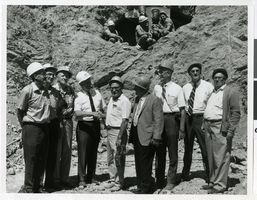
Photograph of Key federal, state and contractor representatives who were on hand when the mole broke through the tunnel, Las Vegas, Nevada, 6-26-69
Date
1969-06-26
Archival Collection
Description
A group of nine key federal, state and contractor representatives who were on hand when the mole broke through the tunnel on 6-26-69. Three unidentified workers are visible above them with the "mole." The first stage of construction was completed between 1968-1971, and is comprised of a main aqueduct, a 3.78 mile tunnel through the River Mountains, eight pumping plants, and 31.4 miles of pipeline. This stage has a peaking capacity of 26.7 million cubic feet of potable water per day. The second stage enlarged the first stage system by expanding some of the existing facilities. New features included five pumping plants, the second barrel to the main aqueduct, and about 30 miles of pipeline and laterals with surge tanks, regulating tanks, and other delivery facilities. In conjunction with this stage, the State of Nevada enlarged and modified the Alfred Merritt Smith water treatment facilities to accommodate additional water supplies. The River Mountains Tunnel was constructed to full capacity in the first stage, and the Saddle Island intake facilities were oversized to accommodate both stages. The aqueduct system has a peaking capability of 53.4 million cubic feet of water per day. The River Mountains Tunnel was constructed during the first stage to accommodate second stage expansion. It is 3.78 miles long and was excavated through the River Mountains, which lie between Las Vegas Valley and Lake Mead. The concrete-lined tunnel has an inside diameter of 121.5 inches, and a maximum capacity of 608 cfs. The SNWA also constructed a larger tunnel, parallel to the River Mountains Tunnel for further expansion. The River Mountains Tunnel is used to convey raw water from Lake Mead to the River Mountains Water Treatment Facility that SNWA constructed near Henderson, NV. The River Mountains Facility, which began delivering treated water in October 2002, treats up to 300 million gallons of water per day, and was designed so it can expand to meet Southern Nevada's needs. In the future, the River Mountains facility will be able to treat up to 600 million gallons of water a day. This facility provides additional reliability and capacity to Southern Nevada's municipal water treatment and distribution capabilities.
Image

Photograph of C. A. Earle Rinker on his 24th birthday, Goldfield (Nev.), September 07, 1907
Date
1904-09-07
Archival Collection
Description
Caption: In front of office next door to office where I worked. Taken on my 24th Birthday. Sept. 7-1907 Goldfield Nev.
Image
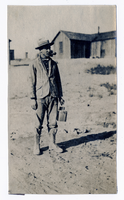
Photograph of C. A. Earle Rinker with metal lunch pail or canteen, Goldfield (Nev.), 1908
Date
1908
Archival Collection
Description
Photograph of C. A. Earle Rinker with metal lunch pail or canteen, Goldfield (Nev.), 1908
Image
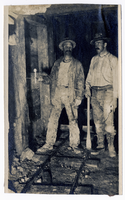
Photograph of two men standing on ore car rails inside a mine, Goldfield (Nev.), 1907
Date
1907
Archival Collection
Description
Photograph of two men standing on ore car rails inside a mine, Goldfield (Nev.), 1907
Image
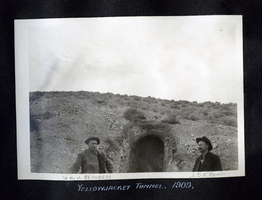
Photograph of Sam Bradburn and J. O'Brien standing at the opening of the Yellowjacket tunnel, Pioneer (Nev.), 1909
Date
1909
Archival Collection
Description
Annotated "Sam. H. Bradbury" [left] and "J. D. O'Brien" [right]
Caption: Yellowjacket Tunnel. 1909.
Caption: Yellowjacket Tunnel. 1909.
Image
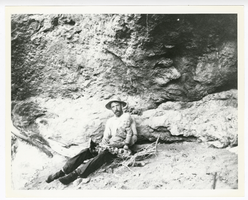
Photograph of O. K. Reed and his son Little O. K. near his claim at Gold Reed, Tonopah (Nev.), 1920
Date
1920
Archival Collection
Description
Photograph of O. K. Reed and his son Little O. K. near his claim at Gold Reed, Tonopah (Nev.), 1920
Image
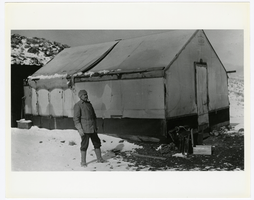
Photograph of Don Finley at Josiah Crowel's Chloride Cliff camp in winter, Beatty (Nev.), 1915
Date
1915
Archival Collection
Description
Photograph of Don Finley at Josiah Crowel's Chloride Cliff camp in winter, Beatty (Nev.), 1915
Image
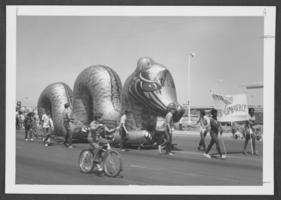
Photograph of the North Las Vegas Chamber of Commerce's float entry in the North Las Vegas 25th anniversary parade, North Las Vegas, Nevada, April-May, 1971
Date
1971-04
1971-05
Archival Collection
Description
The North Las Vegas Chamber of Commerce dragon float entry leads the parade on the 25th anniversary of the city, North Las Vegas, Nevada, April-May, 1971. Photo by Howard W White.
Image
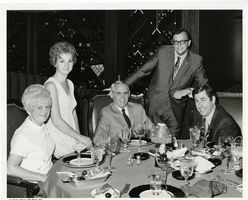
Photograph of Mayor Oran K. Gragson and his wife Bonnie enjoying dinner at the Frontier Hotel and Casino, Las Vegas, Nevada, April 13, 1969
Date
1969-04-13
Archival Collection
Description
Dining at the Frontier Hotel, April 13, 1969. Pictured L-R: Mrs. Bonnie Gragson, Mrs. John Meier, Las Vegas Mayor Oran K. Gragson, John Meier, U. S. Alaska Senator Mike Gravel. The location where the photograph was taken is unknown. Oran Kenneth Gragson (February 14, 1911 – October 7, 2002) was an American businessman and politician. He was the longest-serving mayor of Las Vegas, Nevada, from 1959 to 1975. Gragson, a member of the Republican Party, was a small business owner who was elected Mayor on a reform platform against police corruption and for equal opportunity for people of all socio-economic and racial categories. Gragson died in a Las Vegas hospice on October 7, 2002, at the age of 91. The Oran K. Gragson Elementary School located at 555 N. Honolulu Street, Las Vegas, NV 89110 was named in his honor. Maurice Robert "Mike" Gravel (born May 13, 1930) is a former Democratic United States Senator from Alaska, who served two terms from 1969 to 1981, and a candidate in the 2008 U.S. presidential election. He served in the Alaska House of Representatives from 1963 to 1966 and also became Speaker of the Alaska House. Gravel was elected to the U.S. Senate in 1968. John H. Meier (born September 28, 1933) is an American financier and business consultant now living in Vancouver, Canada. He is noted for his involvement with Howard Hughes, his behind-the-scenes involvement in events that precipitated President Richard M. Nixon's resignation, and his work in the environment. During the Watergate hearings, one man wanted to tell a spellbound nation secrets about the Nixon White House, the CIA and Howard Hughes. He could have told them why the burglary happened, but that was not what the Committee wanted to hear. To keep him from telling his secrets, he was persecuted, jailed and forced into exile in Canada. Investigative reporter Gerald Bellett detailed everything in a book called Age of Secrets. In a revised edition for the first time is an excerpt from John Meier's diary on the Robert F. Kennedy Assassination. John Meier is the first person to reveal everything from the Hughes Organization, and Robert Maheu’s, involvement with the assassination, to Thane Cesar ’s connection to Jack Hooper.
Image
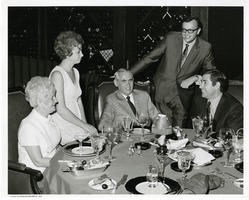
Photograph of Mayor Oran K. Gragson and his wife Bonnie enjoying dinner at the Frontier Hotel and Casino, Las Vegas, Nevada, April 13, 1969
Date
1969-04-13
Archival Collection
Description
Dining at the Frontier Hotel, April 13, 1969. Pictured L-R: Mrs. Bonnie Gragson, Mrs. John Meier, Las Vegas Mayor Oran K. Gragson, John Meier, U. S. Alaska Senator Mike Gravel. The location where the photograph was taken is unknown. Oran Kenneth Gragson (February 14, 1911 - October 7, 2002) was an American businessman and politician. He was the longest-serving mayor of Las Vegas, Nevada, from 1959 to 1975. Gragson, a member of the Republican Party, was a small business owner who was elected Mayor on a reform platform against police corruption and for equal opportunity for people of all socio-economic and racial categories. Gragson died in a Las Vegas hospice on October 7, 2002, at the age of 91. The Oran K. Gragson Elementary School located at 555 N. Honolulu Street, Las Vegas, NV 89110 was named in his honor. Maurice Robert "Mike" Gravel (born May 13, 1930) is a former Democratic United States Senator from Alaska, who served two terms from 1969 to 1981, and a candidate in the 2008 U.S. presidential election. He served in the Alaska House of Representatives from 1963 to 1966 and also became Speaker of the Alaska House. Gravel was elected to the U.S. Senate in 1968. John H. Meier (born September 28, 1933) is an American financier and business consultant now living in Vancouver, Canada. He is noted for his involvement with Howard Hughes, his behind-the-scenes involvement in events that precipitated President Richard M. Nixon's resignation, and his work in the environment. During the Watergate hearings, one man wanted to tell a spellbound nation secrets about the Nixon White House, the CIA and Howard Hughes. He could have told them why the burglary happened, but that was not what the Committee wanted to hear. To keep him from telling his secrets, he was persecuted, jailed and forced into exile in Canada. Investigative reporter Gerald Bellett detailed everything in a book called Age of Secrets. In a revised edition for the first time is an excerpt from John Meier's diary on the Robert F. Kennedy Assassination. John Meier is the first person to reveal everything from the Hughes Organization, and Robert Maheu’s, involvement with the assassination, to Thane Cesar ’s connection to Jack Hooper.
Image
Pagination
Refine my results
Content Type
Creator or Contributor
Subject
Archival Collection
Digital Project
Resource Type
Year
Material Type
Place
Language
